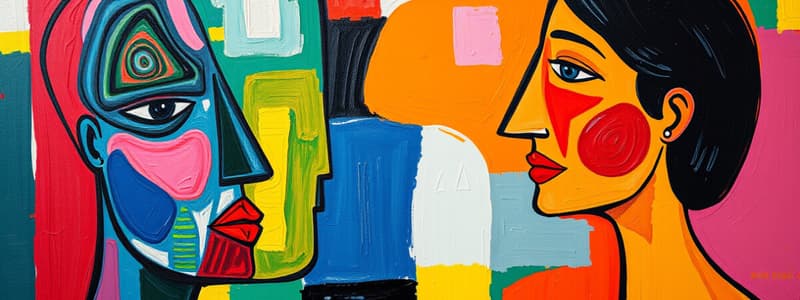Podcast
Questions and Answers
What primarily influences a person's self-concept?
What primarily influences a person's self-concept?
- Personal preferences without external influence
- Biological factors only
- Financial status exclusively
- Cultural norms and individual experiences (correct)
Which factor affects self-concept through the impact of group dynamics?
Which factor affects self-concept through the impact of group dynamics?
- Family background
- Colonialism
- Personal achievements
- Migration and diaspora (correct)
What does the term 'ideal self' refer to?
What does the term 'ideal self' refer to?
- An individual's aspirations regarding who they want to be (correct)
- One’s actual characteristics
- The societal perception of an individual
- All the personalities an individual presents
How does cognitive dissonance affect self-concept?
How does cognitive dissonance affect self-concept?
Which aspect is NOT associated with self-concept clarity?
Which aspect is NOT associated with self-concept clarity?
What role does trauma play in self-concept?
What role does trauma play in self-concept?
What is self-image primarily concerned with?
What is self-image primarily concerned with?
What major factors shape the self-concept during development?
What major factors shape the self-concept during development?
What does self-concept in sociology primarily refer to?
What does self-concept in sociology primarily refer to?
Which factor significantly shapes an individual's self-perception?
Which factor significantly shapes an individual's self-perception?
What is the Looking-Glass self concept according to Charles Cooley?
What is the Looking-Glass self concept according to Charles Cooley?
How does self-esteem relate to self-concept?
How does self-esteem relate to self-concept?
What does the concept of intersectionality refer to in relation to self-concept?
What does the concept of intersectionality refer to in relation to self-concept?
Which aspect of self-concept is influenced by globalization?
Which aspect of self-concept is influenced by globalization?
In anthropology, how is self-concept understood?
In anthropology, how is self-concept understood?
How does technology influence self-concept?
How does technology influence self-concept?
Flashcards are hidden until you start studying
Study Notes
The Self in Allied Sciences
- Self-Concept in Sociology: Represents an individual's personal understanding encompassing thoughts, beliefs, and feelings about identity.
- Socialization's Role: Family, peers, and media significantly shape a person's self-perception.
- Cultural Influence: Societal norms and cultural backgrounds play a crucial role in forming self-identity.
- Looking-Glass Self: Concept by Charles Cooley suggesting self-concept arises from how others perceive us.
- Identity Dynamics: A balance between personal identity (self-view) and social identity (societal definitions) influences overall self-concept.
- Impact of Social Roles: Different societal roles (e.g., occupational, familial) can affect an individual's self-concept.
- Self-Esteem Connection: There is a significant link between one’s self-esteem and social feedback affecting self-concept.
- Gender Impact: Gender identity and roles shape how individuals see themselves socially.
- Economic Status: Social class influences perceptions and self-concept formulation.
- Technological Influence: Social media and digital platforms have a profound impact on self-perception and identity.
- Deviance Definition: Deviance is behavior that goes against societal expectations, which can affect one's self-concept.
- Life Stages: Self-concept evolves from childhood through to old age, reflecting life experiences.
- Intersectionality: Overlapping identities such as race and gender affect how individuals perceive themselves.
- Globalization Effects: Multicultural influences around the globe impact self-concept formation.
- Online Personas: Fragmentation due to various online identities can complicate self-concept and coherence.
Self Concept in Anthropology
- Field Overview: Anthropology studies humans, their behaviors, cultures, societies, and evolutionary history to appreciate human diversity.
- Cultural Context of Self: In anthropology, self-concept encapsulates how individuals define themselves based on cultural and societal influences.
- Colonialism's Legacy: Colonial history affects contemporary self-concept and identity formation.
- Migration Effects: Migration and the diaspora influence cultural self-conception and identity.
- Cultural Personhood: Various cultures interpret what it means to be a "person," impacting self-perception.
- Body Image Influence: Cultural beauty standards significantly affect individual self-concept.
- Impact of Modernization: The processes of globalization and modernization reshape self-concept across societies.
Self Concept in Psychology
- Psychology Definition: The scientific exploration of the mind and behavior, aimed at understanding thought processes, emotions, and actions.
- Overall Self-Concept: Self-concept pertains to how individuals understand and perceive themselves, shaped by experiences and social feedback.
- Self-Esteem Relationship: Interconnection between self-concept and perceived self-worth plays a vital role in individual well-being.
- Self-Image Factor: Self-image describes how individuals view their physical and personal traits.
- Ideal Self Concept: Distinguishes between the aspirational self individuals wish to become versus their current self.
- Developmental Changes: Self-concept is dynamic, evolving from childhood through adulthood.
- Social Influences: Family, peers, and societal interactions greatly influence the formation of self-concept.
- Cognitive Dissonance: Conflicts between beliefs and behaviors can lead to adaptations in self-concept.
- Mental Health Connection: Self-concept plays a critical role in mental well-being, with variations affecting psychological disorders.
- Self-Perception Theory: Individuals derive self-concept from observing their own behaviors and actions.
- Clarity of Self-Concept: Consistency and stability in one’s understanding of self are essential for personal coherence.
- Trauma Effects: Traumatic experiences can notably alter or distort self-concept.
Studying That Suits You
Use AI to generate personalized quizzes and flashcards to suit your learning preferences.




